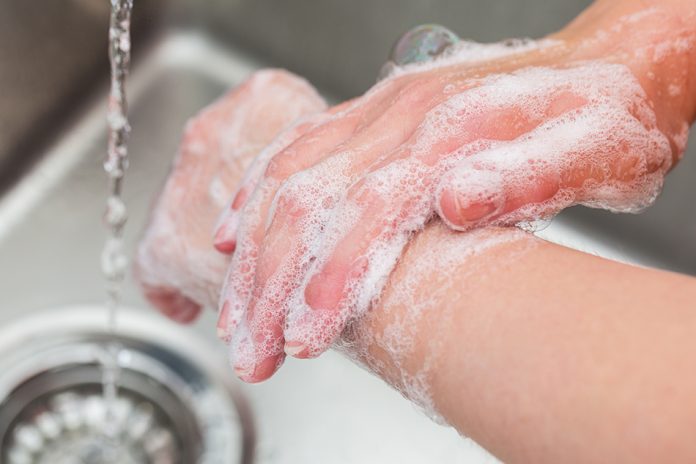We often hear this age old adage that an apple a day keeps you away from the doctor but good handwashing skill keeps you distances far from the hospital. Hand washing and hand hygiene has become a commonly practiced culture after COVID-19 arose although it is no new thing. One of the most important steps we can take to avoid getting sick and transferring germs to others is to keep our hands clean. Hands not washed with soap and clean, running water can spread a variety of infections and illnesses of which COVID-19 is no exception. We surrounded by germs so hand hygiene can not be neglected.
Germs on our hands are the main conduit for infection into our bodies.
Feces (poop) from humans and our pets is a major source of diarrhea-causing pathogens like V.cholerae and Salmonella(typhoid) and as well as respiratory tract infection like adenovirus(common cold) and sinusitis. These bacteria can be picked up after using the restroom or when a mother changes a diaper, but they can also be picked up in less obvious ways, such as touching raw meats with undetectable levels of animal feces. Through our daily interactions like exchanging pleasantries by transferring money during transactions, use of mobile phones, door knobs, hand shakes and hugs we transfer germs one to another.
These contaminated hands make their way to our face, to our eyes causing “Apollo” to the nose causing sinusitis and common cold and the mouth causing diarrhea. According to statistics, we touch our face to less than 12 times in an hour. This means that contaminated hands inoculate these facial orifices not less than 12 times. A pencil tip of germs can contain close to 1 trillion of disease causing organisms. These germs can be transmitted from person to person and make people sick if they do not get cleansed off under running water with soap.
Children all throughout the world suffer from not washing their hands.
According to centre for disease control(CDC), diarrhea and pneumonia, the world’s top two killers of young children, kill a staggering number of about 1.8 million children under the age of five each year. Handwashing with soap could protect one out of every three young children with diarrhea and nearly one out of every five young children with respiratory diseases such as pneumonia. Although most people around the world wash their hands with water, just a small percentage add soap. Handwashing with soap is far more effective at removing germs. I want to add my voice that the Ghana Education Service should re-enforce handwashing teaching and soap access in schools can assist boost the culture of good basic hand hygiene skills and reduce absenteeism in schools.
We all know the state of certain public washrooms across the country that neglect the provision of soap. Metropolitan and district task forces should regularize periodic visit to access the hand hygiene situation in some of our public restrooms. Diarrheal diseases feature as one of the top 10 causes of death in Ghana asserted by Global Burden Of Disease(GBD) Ghana, 2018. Extrapolatively speaking, I think hand washing will go a long to reduce clinic attendance and death.
Hand washing helps to reduce disease and infection spread.
When COVID-19 hit the world and little was known about its modus opperandi, hand washing was the enduring remedy and still is. Indeed handwashing reduces infection spread. Unwashed hands can contaminate meals and beverages while they are being prepared or eaten. Germs can multiply in specific foods or drinks under certain conditions, causing people to become ill. We frequently touch their eyes, nose, and mouth without even realizing it. Germs can get into the body through the eyes, nose and mouth and make us sick. Handwashing helps prevent diarrhea and respiratory infections, as well as skin and eye infections. Managers and CEO’s, do you want to reduce absenteeism, make hand hygiene a priority. You want to have a healthy home? Choose hand washing today. It may interest you to know that you will be saving money and building a financially potent home because you didn’t visit the hospital.
Antibiotic resistance can be combated via handwashing.
One of the most abused group of drugs in our age is antibiotics. We take medicines because we are not in our usual state of health because of infections. Globally, common cold and diarrhea come together as chief culprits of morbidity. With a common denominator of unwashed hands. By preventing illness, people use fewer antibiotics and are less likely to develop antibiotic resistance. Antibiotics are frequently administered for health problems that aren’t necessary 14. By reducing the number of infections and washing hands often, people can avoid overusing antibiotics, which is the single most important factor in antibiotic resistance worldwide. Handwashing can help protect people from becoming ill with antibiotic-resistant organisms that are difficult to cure.
Charity they say begins at home, if handwashing is added to the culture and social fabric it will go a long way to help reduce illness. Even when COVID-19 becomes a thing of the past I want to encourage all to continue in the good art of handwashing to prevent not only the feared coronavirus but diarrhea diseases as well.




